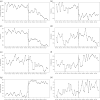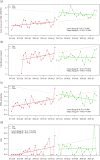Impact of an antimicrobial stewardship programme on antibiotic utilization and resistance burden in patients with acute leukaemia: an 11-year longitudinal cohort study using interrupted time-series analysis
- PMID: 38863389
- PMCID: PMC11290886
- DOI: 10.1093/jac/dkae199
Impact of an antimicrobial stewardship programme on antibiotic utilization and resistance burden in patients with acute leukaemia: an 11-year longitudinal cohort study using interrupted time-series analysis
Abstract
Background: Antimicrobial resistance (AMR), driven by inappropriate and overuse of antibiotics, poses a significant threat, especially to patients with acute leukaemia.
Objectives: To evaluate the impact of antimicrobial stewardship programmes (ASPs) on antibiotic use and analyse temporal changes in bloodstream infections (BSI) caused by AMR organisms.
Methods: We performed a retrospective, interventional, longitudinal cohort study spanning an 11-year period. ASPs included optimizing antibiotic use, enhancing tracking and reporting systems and delineating leadership and accountability. A segmented regression model of interrupted time series was used to evaluate the trend of antibiotic consumption and BSI with AMR organisms after the interventions.
Results: A total of 3296 BSI episodes with 454 419 days of therapy (DOT) from 7754 patients were obtained. ASPs were significantly associated with an immediate reduction [-70.03 DOT/1000 patient-days (PD), P = 0.036] and a decreasing trend (-11.65 DOT/1000 PD per quarter, P < 0.001) in overall antibiotic use. The increasing incidence of BSI with AMR before ASP intervention was notably curbed and revealed a decreasing trend (slope change: -0.06 BSI/1000 PD per quarter, P = 0.002). The decreasing trend was more significant for Enterobacterales: ciprofloxacin-resistant and ESBL-producing isolates showed a slope change of -0.06 BSI/1000 PD and -0.08 BSI/1000 PD per quarter, respectively (all P < 0.05). However, Pseudomonas aeruginosa BSI increased.
Conclusions: Multidimensional ASPs effectively reduced both the immediate and trends in overall antibiotic usage even in patients with acute leukaemia. Additionally, there was a notable decrease in the incidence of BSI caused by AMR organisms, particularly among Enterobacterales.
© The Author(s) 2024. Published by Oxford University Press on behalf of British Society for Antimicrobial Chemotherapy.
Figures




References
-
- Baur D, Gladstone BP, Burkert Fet al. . Effect of antibiotic stewardship on the incidence of infection and colonisation with antibiotic-resistant bacteria and Clostridium difficile infection: a systematic review and meta-analysis. Lancet Infect Dis 2017; 17: 990–1001. 10.1016/S1473-3099(17)30325-0 - DOI - PubMed
Publication types
MeSH terms
Substances
LinkOut - more resources
Full Text Sources
Medical

